英美文学选读鲁滨逊漂流记翻译分析
鲁宾逊漂流记的中英文介绍

鲁宾逊漂流记的中英文介绍英语简介:Robinson Crusoe,supposedly based on the real adventure,is in fact,a work of sheer imagination.The novel consists actually of three parts though only the first part is most well-know and widely read.In this part the hero of the story,Robinson crusoe,narrates in the first person how he goes to sea,gets shipwrecked and marooned on a lonely island,struggles to live for twenty-four years there and finally gets relieved and returns to England.The story starts with Roginson Crusoe's running away from home.An inexperienced teenager and a young man full of bright fancies about the future,he naturally chooses going to sea,because in thoese days it meant a chance to live a chivalrous life,to see the wonders of the world and to make a fortune.After many setbacks and adventures on the sea,he settles down in Brazil as a planter.But the call of the sea is so strong that he soon embarks on another voyage,this time,to Africa.Unfortunately a frightful storm blows the boat off its course and shipwrecks it near an island.Of all the ship's crew Robinson alone escape to the shore after strenuous efforts.After salvaging from the wrecked ship some stores of necessities such asbread,rice,barley,corn,planks,lead and gunpowder,and axe and two saws,which he later manages to bring to the island with a self-made raft.After several futile attempts to leave the island,Robinson settles himself down to a hard and lonely life.He grows crops,domesticates animals and builds comfortable homes for himself.His life takes a turn for the better when he saves from the hands of savages a young Black man,whom he names Friday.Robinson teaches him English and educates him in such a way that Friday soon becomes a loyal servant and an indispensable help to him.Finally they are picked up by an English ship and return to England.Thus end the first part of the story.In Robinson Crusoe,Defore traces the growth of Robinson from a naive and artless youth into a shrewd and hardened man,tempered by numerous trials in his eventfull life.The realistic account of the successful struggle of Robinson single-handedly against the hostile nature forms the best part of the novel.《鲁宾逊.克鲁索漂流记》似乎是根据真人真事改编创作的,但实际上是纯粹虚构的小说。
鲁滨逊漂流记摘抄加点评

《鲁滨逊漂流记》是英国作家丹尼尔·笛福的一部经典小说,讲述了主人公鲁滨逊·克鲁索在荒岛上生存的故事。
以下是一些摘抄和点评:摘抄:1. 我完全不顾父愿,甚至违抗父命,也全然不听母亲的恳求和朋友们的劝阻。
我的这种天性,似乎注定了我未来不幸的命运。
点评:这句话表现了鲁滨逊的冒险精神和不屈不挠的性格,这种性格也让他在荒岛上生存下来。
2. 我从船上带回枪支弹药、工具和生活用品,这些对于我在孤岛上的生存是必不可少的。
点评:这句话表明了鲁滨逊的理智和聪明,他知道如何利用资源来改善自己的生存条件。
3. 我每天都要出去打猎,这不仅是为了维持生计,也是为了保持警惕,以防不测。
点评:这句话展现了鲁滨逊的警觉和自我保护能力,他时刻保持警惕,以防危险来临。
4. 在这孤独的荒岛上,我学会了做家具、打猎、捕鱼和种植庄稼,这些技能帮助我逐渐适应了岛上的生活。
点评:这句话说明了鲁滨逊的适应能力和创造力,他用自己的智慧和技能在荒岛上生存下来。
5. 在孤岛上生活的28年里,我经历了各种困难和危险,但我从未放弃过希望,我始终相信会有一天离开这个荒岛。
点评:这句话体现了鲁滨逊的坚韧和乐观,他始终保持希望,相信自己能够克服困难和危险。
6. 在孤岛生活的日子里,我学会了感恩和知足。
虽然我身处荒野,但我感激命运赐予我生命,感激身边的朋友和家人,他们一直支持着我。
知足也让我享受着这片荒野所带来的宁静与自由。
点评:这句话描绘了鲁滨逊积极的心态和感恩的精神,即使在困境中,他也能够找到生活的美好和幸福。
7. 我试图通过日记记录下我每天的生活和经历,这也成为了我与世界的联系。
我写下了我对生活的思考,对自由的渴望,对人生的理解。
点评:这句话展现了鲁滨逊的自我反思和记录生活的习惯,这不仅帮助他度过了孤独的时光,也让我们看到了人类对生活的追求和思考。
8. 我对岛上的每一个角落都了如指掌,我探索了它的深处,征服了它的险恶。
即使这个岛是如此荒凉和险恶,但我却开始欣赏它的美丽和独特。
鲁滨逊漂流记选段译文
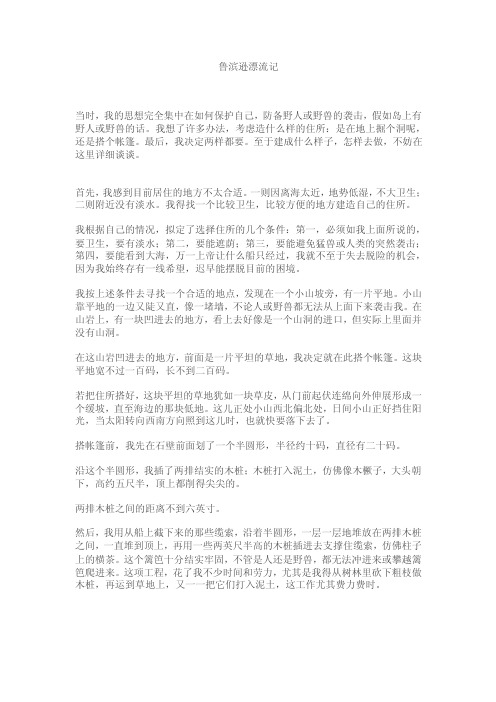
鲁滨逊漂流记当时,我的思想完全集中在如何保护自己,防备野人或野兽的袭击,假如岛上有野人或野兽的话。
我想了许多办法,考虑造什么样的住所:是在地上掘个洞呢,还是搭个帐篷。
最后,我决定两样都要。
至于建成什么样子,怎样去做,不妨在这里详细谈谈。
首先,我感到目前居住的地方不太合适。
一则因离海太近,地势低湿,不大卫生;二则附近没有淡水。
我得找一个比较卫生,比较方便的地方建造自己的住所。
我根据自己的情况,拟定了选择住所的几个条件:第一,必须如我上面所说的,要卫生,要有淡水;第二,要能遮荫;第三,要能避免猛兽或人类的突然袭击;第四,要能看到大海,万一上帝让什么船只经过,我就不至于失去脱险的机会,因为我始终存有一线希望,迟早能摆脱目前的困境。
我按上述条件去寻找一个合适的地点,发现在一个小山坡旁,有一片平地。
小山靠平地的一边又陡又直,像一堵墙,不论人或野兽都无法从上面下来袭击我。
在山岩上,有一块凹进去的地方,看上去好像是一个山洞的进口,但实际上里面并没有山洞。
在这山岩凹进去的地方,前面是一片平坦的草地,我决定就在此搭个帐篷。
这块平地宽不过一百码,长不到二百码。
若把住所搭好,这块平坦的草地犹如一块草皮,从门前起伏连绵向外伸展形成一个缓坡,直至海边的那块低地。
这儿正处小山西北偏北处,日间小山正好挡住阳光,当太阳转向西南方向照到这儿时,也就快要落下去了。
搭帐篷前,我先在石壁前面划了一个半圆形,半径约十码,直径有二十码。
沿这个半圆形,我插了两排结实的木桩;木桩打入泥土,仿佛像木橛子,大头朝下,高约五尺半,顶上都削得尖尖的。
两排木桩之间的距离不到六英寸。
然后,我用从船上截下来的那些缆索,沿着半圆形,一层一层地堆放在两排木桩之间,一直堆到顶上,再用一些两英尺半高的木桩插进去支撑住缆索,仿佛柱子上的横茶。
这个篱笆十分结实牢固,不管是人还是野兽,都无法冲进来或攀越篱笆爬进来。
这项工程,花了我不少时间和劳力,尤其是我得从树林里砍下粗枝做木桩,再运到草地上,又一一把它们打入泥土,这工作尤其费力费时。
鲁滨逊漂流记黑布林英语阅读翻译
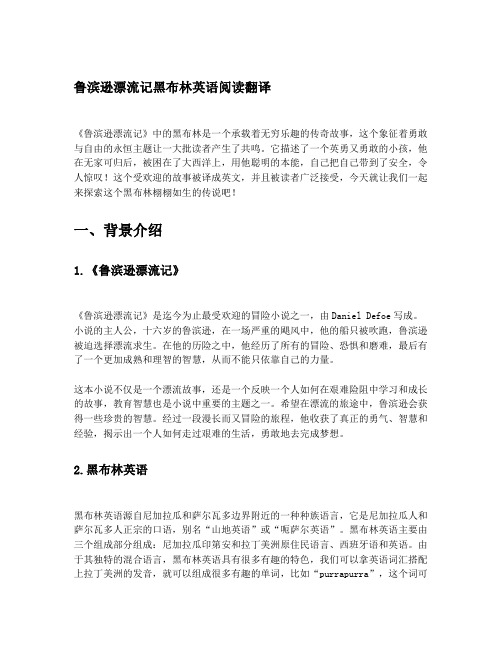
鲁滨逊漂流记黑布林英语阅读翻译《鲁滨逊漂流记》中的黑布林是一个承载着无穷乐趣的传奇故事,这个象征着勇敢与自由的永恒主题让一大批读者产生了共鸣。
它描述了一个英勇又勇敢的小孩,他在无家可归后,被困在了大西洋上,用他聪明的本能,自己把自己带到了安全,令人惊叹!这个受欢迎的故事被译成英文,并且被读者广泛接受,今天就让我们一起来探索这个黑布林栩栩如生的传说吧!一、背景介绍1.《鲁滨逊漂流记》《鲁滨逊漂流记》是迄今为止最受欢迎的冒险小说之一,由Daniel Defoe写成。
小说的主人公,十六岁的鲁滨逊,在一场严重的飓风中,他的船只被吹跑,鲁滨逊被迫选择漂流求生。
在他的历险之中,他经历了所有的冒险、恐惧和磨难,最后有了一个更加成熟和理智的智慧,从而不能只依靠自己的力量。
这本小说不仅是一个漂流故事,还是一个反映一个人如何在艰难险阻中学习和成长的故事,教育智慧也是小说中重要的主题之一。
希望在漂流的旅途中,鲁滨逊会获得一些珍贵的智慧。
经过一段漫长而又冒险的旅程,他收获了真正的勇气、智慧和经验,揭示出一个人如何走过艰难的生活,勇敢地去完成梦想。
2.黑布林英语黑布林英语源自尼加拉瓜和萨尔瓦多边界附近的一种种族语言,它是尼加拉瓜人和萨尔瓦多人正宗的口语,别名“山地英语”或“呃萨尔英语”。
黑布林英语主要由三个组成部分组成:尼加拉瓜印第安和拉丁美洲原住民语言、西班牙语和英语。
由于其独特的混合语言,黑布林英语具有很多有趣的特色,我们可以拿英语词汇搭配上拉丁美洲的发音,就可以组成很多有趣的单词,比如“purrapurra”,这个词可以把英语“pretty”和拉丁美洲“purra”混合组成,意思就是“非常漂亮”。
另外,在黑布林语言里,还有一种叫做“ruzz”的语音,它是英语“rock”和拉丁美洲“ruz”的混和,意思是“巨大的岩石”。
二、黑布林英语阅读翻译的内容1.主要讲述的是乌德·鲁滨逊的漂流旅行经历,乌德及其伙伴们在大西洋上苦苦漂流,在遭遇种种困难的情况下希望能够获得自救。
鲁滨逊漂流记读后感英语译文
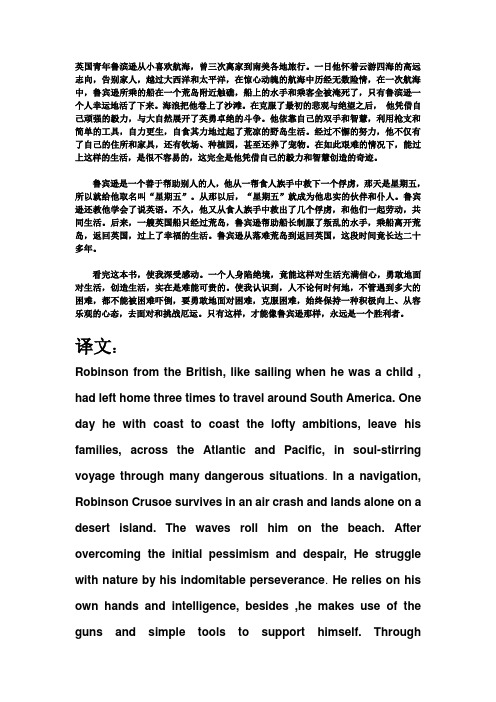
英国青年鲁滨逊从小喜欢航海,曾三次离家到南美各地旅行。
一日他怀着云游四海的高远志向,告别家人,越过大西洋和太平洋,在惊心动魄的航海中历经无数险情,在一次航海中,鲁宾逊所乘的船在一个荒岛附近触礁,船上的水手和乘客全被淹死了,只有鲁滨逊一个人幸运地活了下来。
海浪把他卷上了沙滩。
在克服了最初的悲观与绝望之后,他凭借自己顽强的毅力,与大自然展开了英勇卓绝的斗争。
他依靠自己的双手和智慧,利用枪支和简单的工具,自力更生,自食其力地过起了荒凉的野岛生活。
经过不懈的努力,他不仅有了自己的住所和家具,还有牧场、种植园,甚至还养了宠物。
在如此艰难的情况下,能过上这样的生活,是很不容易的,这完全是他凭借自己的毅力和智慧创造的奇迹。
鲁宾逊是一个善于帮助别人的人,他从一帮食人族手中救下一个俘虏,那天是星期五,所以就给他取名叫“星期五”。
从那以后,“星期五”就成为他忠实的伙伴和仆人。
鲁宾逊还教他学会了说英语。
不久,他又从食人族手中救出了几个俘虏,和他们一起劳动,共同生活。
后来,一艘英国船只经过荒岛,鲁宾逊帮助船长制服了叛乱的水手,乘船离开荒岛,返回英国,过上了幸福的生活。
鲁宾逊从落难荒岛到返回英国,这段时间竟长达二十多年。
看完这本书,使我深受感动。
一个人身陷绝境,竟能这样对生活充满信心,勇敢地面对生活,创造生活,实在是难能可贵的。
使我认识到,人不论何时何地,不管遇到多大的困难,都不能被困难吓倒,要勇敢地面对困难,克服困难,始终保持一种积极向上、从容乐观的心态,去面对和挑战厄运。
只有这样,才能像鲁宾逊那样,永远是一个胜利者。
译文:Robinson from the British, like sailing when he was a child , had left home three times to travel around South America. One day he with coast to coast the lofty ambitions, leave his families, across the Atlantic and Pacific, in soul-stirring voyage through many dangerous situations. In a navigation, Robinson Crusoe survives in an air crash and lands alone on a desert island.The waves roll him on the beach.After overcoming the initial pessimism and despair, He struggle with nature by his indomitable perseverance. He relies on his own hands and intelligence, besides ,he makes use of the guns and simple tools to support himself.Throughunremitting efforts, he has his own home and furniture,and the ranch, plantations, and even raising the pet .Under such difficult circumstances, it is not easy to live such a life,,It is his perseverance and wisdom that to create a miracle.Robinson is good at helping others, he save a captive from the hands of a gang of cannibals, that day is a Friday, so he named him " Friday ".From then on, " Friday " become his faithful companion and servant.Robinson also teaches him to speak English. Soon, he also rescues several prisoners from the cannibal, and they work together, live together. Later, a British ships through the desert island, Robinson helps captain subdue the seaman,and sails away to a desert island, returns to England, and lives a happy life. Robinson from desert island to return to England, this time for more than 20 years.As Palmer said "I always make the greatest efforts, even in difficult when do so and so it is. I never give up trying, I never think that I didn't get the chance of success" .After reading this book, I was deeply moved .It is valuable for a desperate person can do this to life is full of confidence, face up to life, create life, I realize that we should face the difficulties andovercome it bravely , and always maintain a optimistic attitude no matter when and where and how great the difficulties encountered it is. Only in this way, can we like Robinson Crusoe , is always a winner.。
《鲁滨逊漂流记》中译本解读中西文化差异

《鲁滨逊漂流记》中译本解读中西文化差异摘要:英国作家笛福(1660-1731)的《鲁滨逊漂流记》(1719)被誉为西方社会除《圣经》外流传最广的一部文学作品。
就一般特点,《香滨进漂流记》(以下简称《漂流记》)属于冒险小说,而其不朽的生命力却表明,它的价值已远远超过了“胃险小说”的普通涵义。
本文试图从中西文化角度进行阐述。
关键词:《鲁滨逊漂流记》;笛福;文化1719年,笛福发表了《鲁滨逊漂流记》。
小说以第一人称和日记、回忆等写作手法,开创了18世纪现实主义小说创作的先河。
受启蒙思想的影响,即文学创作/要自然,要真实0。
笛福把鲁滨逊作为资产阶级的代表和主人公来加以描写和歌颂:用日常的生活语言、真实而自然的表现方式来描写一个英雄。
笛福曾这样评论鲁滨逊:形象为不安于现状,勇于行动,勇于追求,不畏艰险,按照现代文明的模式,开辟新天地的创造者。
这段离奇的故事,当时假托番滨逊回忆录的名义出版,立即引直起强烈的社会反应。
这不仅是因为作者提供了一种崭新的文学形式,更主要是由于鲁滨逊的故事适应了资产阶级上升时期冒险事业的需要。
为了探寻新的土地,新的原料来源和新的市场,新兴资产阶级需要这种大胆开拓的勇气和克服困难的毅力,来支持他们作种种危险的旅行。
笛福作为具有新兴资产阶级意识的作家,在作品中把文艺复兴以来西方社会大力提倡的人性本体发挥到了极致。
人的勤劳,智慧,勇敢,毅力和创造才能提到了前所未有的高度.笛福深信作为万物灵长的人类有力量战胜环境,征服自然,并获得他希望向生活索取的一切。
但同时,循着作者的思路,普滨逊也日渐体现出为小资产者的一面,无论是面对人或物,明确的所有权观念往往是鲁滨逊脑子里首先出现的东西。
他发现荒岛后,自命为这块领地的“总督,’;在救了土人星期五后,最先教给他的英语词汇是“主人”;当西班牙船靠岸时,他要捍卫的是自己对小岛的所有权,等等。
这是资产阶级的理性精神,它已经成为主宰鲁滨逊思想行为的一种本能,也恰到好处地反映了当时西方社会对物质财富的普通看法。
双语经典《鲁滨逊漂流记》阅读助译

双语经典《鲁滨逊漂流记》阅读助译Chapter.1 Out to Sea鲁宾逊作为家庭中的第三个儿子,无望继承家产,于是他想要出海。
但是父母都不愿让他去,于是在一年后,他一声不吭地和他的朋友一起坐海轮去伦敦。
1651年9月1日,他们起航去伦敦。
不久海上刮起了大风,鲁宾逊跪倒在他的船舱里,慌乱中,他保证要听父母的话学习法律。
接着,大海平静下来。
朋友安慰了他,于是他又忘记了他的誓言,享受着海上的生活。
几天后,天又暗了下来。
鲁宾逊原以为不久就会天清气朗,可是船体漏水了,突然一声巨响,风暴把船撕成了两半。
终于船长求救信号得到的回应,一艘小艇把船员送到港口。
鲁宾逊一溜烟的跑回了家。
Chapter.2 Pirates!有一天鲁滨逊碰到了他的朋友和他朋友的父亲,这时鲁滨逊已经下了决心要再次出海。
朋友的父亲知道了鲁滨逊出海的经历时,他也劝他不要再出海了,他不是这块料,可是鲁宾逊很倔强,他不管他和他的父亲怎么说,他都不愿放弃出海。
这时,他碰到了一个从非洲回来正要返程的船主。
他向船主诉说了想出去看看世界的渴望,于是船主邀请鲁滨逊坐他的船。
这次到非洲的航程十分顺利,鲁滨逊吸收了很多知识。
这次出海的经历教育了他也让他变得富有,而他已经确立了自己的人生志向:他要与他的朋友一起出海经商。
再次出海时,物是人非。
他的好朋友与世长辞之后,他的好运气似乎也到了头。
鲁滨逊在北非沿岸遭遇的一艘土耳其海盗船,他们拼命想逃脱但海盗船的速度更快。
他们用12门小型火炮开火,对方用18门火炮和枪械还击。
海盗船逼近,60个海盗跳上了他们的船,他们奋力反抗,但海盗们砍断了索具,杀了三个最勇猛的水手,打伤了更多。
鲁滨逊他们不得不缴械投降被抓到海盗船上,被献给了摩尔皇帝,只留下鲁滨逊一个人作为海盗船长的战利品,从此他便开始的奴隶生涯。
Chapter.3 A Clever Escape鲁宾逊整天盘算着如何逃脱牢笼,可海盗出海从不带他。
与海盗共处的两年中鲁滨逊的地位逐步上升,船长发现他很会钓鱼,于是每次都会带鲁宾逊去捕鱼。
鲁滨逊漂流记译文对比

鲁滨逊漂流记译文对比以下是为您生成的《鲁滨逊漂流记》的译文对比:原文:I was born in 1632 in the city of York in the north of England. My father was German, but he came to live and work in England. He was a successful merchant.译文:我在 1632 年出生在英格兰北部约克市。
我爹是德国人,不过他跑到英格兰来生活和工作啦。
他是个挺成功的商人。
您瞧瞧,这原文里“merchant”这词,挺正式的吧,咱就给它翻成“商人”,多接地气。
原文:I always wanted to go to sea. My father did not like this and he was very angry with me. But I did not listen to him.译文:我一直都想去海上闯荡闯荡。
我爹可不喜欢我这想法,还对我特别生气。
但我可没听他的。
您看这里,“go to sea”,咱就直接说“去海上闯荡闯荡”,是不是感觉就像咱平常跟朋友聊天时说的话?原文:One day, I decided to go to sea. I met a friend who wanted to go with me. We bought a small boat and left England.译文:有一天,我决定出海去。
我碰到个朋友,他也想跟我一块儿去。
咱就买了条小船,离开英格兰啦。
这“decided”,咱就说“决定”,简单明了,大家都懂。
原文:The weather was very bad. The wind was strong and the sea was very rough. Our boat was broken and we were in great danger.译文:这天气那叫一个糟。
黑布林《鲁滨逊漂流记》译文
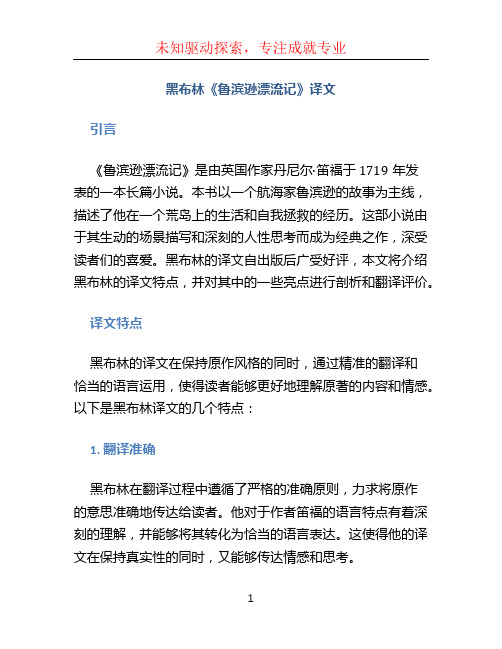
黑布林《鲁滨逊漂流记》译文引言《鲁滨逊漂流记》是由英国作家丹尼尔·笛福于1719年发表的一本长篇小说。
本书以一个航海家鲁滨逊的故事为主线,描述了他在一个荒岛上的生活和自我拯救的经历。
这部小说由于其生动的场景描写和深刻的人性思考而成为经典之作,深受读者们的喜爱。
黑布林的译文自出版后广受好评,本文将介绍黑布林的译文特点,并对其中的一些亮点进行剖析和翻译评价。
译文特点黑布林的译文在保持原作风格的同时,通过精准的翻译和恰当的语言运用,使得读者能够更好地理解原著的内容和情感。
以下是黑布林译文的几个特点:1. 翻译准确黑布林在翻译过程中遵循了严格的准确原则,力求将原作的意思准确地传达给读者。
他对于作者笛福的语言特点有着深刻的理解,并能够将其转化为恰当的语言表达。
这使得他的译文在保持真实性的同时,又能够传达情感和思考。
2. 语言流畅黑布林的译文语言流畅自然,读起来非常舒畅。
他善于运用各种修辞手法,如比喻、排比、夸张等,使得译文更具生动感和表现力。
这样的语言处理不仅能够吸引读者的注意力,同时也提升了阅读的乐趣。
3. 情感传递黑布林通过译文,成功地传递了原著中的各种情感。
无论是主人公鲁滨逊的孤独与绝望,还是对生活和自由的向往,黑布林都能够通过翻译准确地表达出来。
读者可以通过译文深入地感受到原著所要表达的情感,产生共鸣。
译文亮点在黑布林的译文中,有几个亮点值得我们注意和赞赏。
1. 活用词汇黑布林在译文中活用了大量丰富的词汇,通过精准的选择使得译文更加生动和丰富。
例如,在描述鲁滨逊建造木屋的过程中,他使用了“雕刻”、“植物纤维”、“抛光”等词汇,形象地传达了原著中的场景和细节。
2. 独特的句式结构黑布林在译文中使用了一些独特的句式结构,使得译文具有独特的韵律和节奏。
例如,在描述鲁滨逊与星期五相遇的情景时,他使用了一连串的简洁短语和修饰词,营造出一种悬念和紧张感。
3. 幽默感的传递除了传达原著中的情感,黑布林还成功地传递了一些幽默感。
对鲁滨逊漂流记的看法与观点
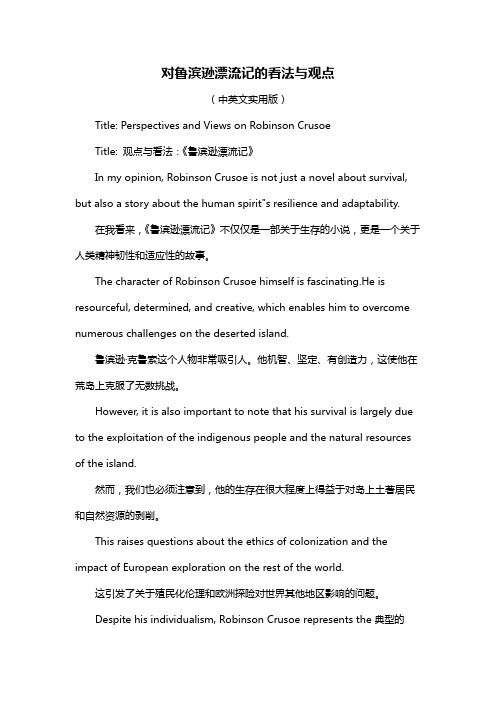
对鲁滨逊漂流记的看法与观点(中英文实用版)Title: Perspectives and Views on Robinson CrusoeTitle: 观点与看法:《鲁滨逊漂流记》In my opinion, Robinson Crusoe is not just a novel about survival, but also a story about the human spirit"s resilience and adaptability.在我看来,《鲁滨逊漂流记》不仅仅是一部关于生存的小说,更是一个关于人类精神韧性和适应性的故事。
The character of Robinson Crusoe himself is fascinating.He is resourceful, determined, and creative, which enables him to overcome numerous challenges on the deserted island.鲁滨逊·克鲁索这个人物非常吸引人。
他机智、坚定、有创造力,这使他在荒岛上克服了无数挑战。
However, it is also important to note that his survival is largely due to the exploitation of the indigenous people and the natural resources of the island.然而,我们也必须注意到,他的生存在很大程度上得益于对岛上土著居民和自然资源的剥削。
This raises questions about the ethics of colonization and the impact of European exploration on the rest of the world.这引发了关于殖民化伦理和欧洲探险对世界其他地区影响的问题。
鲁滨逊漂流记翻译
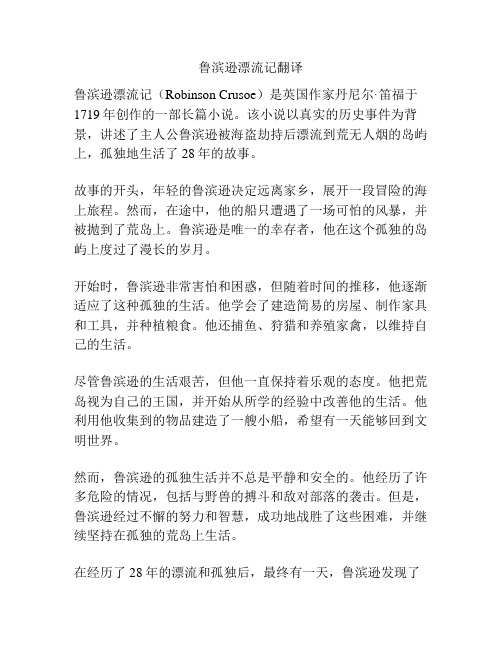
鲁滨逊漂流记翻译鲁滨逊漂流记(Robinson Crusoe)是英国作家丹尼尔·笛福于1719年创作的一部长篇小说。
该小说以真实的历史事件为背景,讲述了主人公鲁滨逊被海盗劫持后漂流到荒无人烟的岛屿上,孤独地生活了28年的故事。
故事的开头,年轻的鲁滨逊决定远离家乡,展开一段冒险的海上旅程。
然而,在途中,他的船只遭遇了一场可怕的风暴,并被抛到了荒岛上。
鲁滨逊是唯一的幸存者,他在这个孤独的岛屿上度过了漫长的岁月。
开始时,鲁滨逊非常害怕和困惑,但随着时间的推移,他逐渐适应了这种孤独的生活。
他学会了建造简易的房屋、制作家具和工具,并种植粮食。
他还捕鱼、狩猎和养殖家禽,以维持自己的生活。
尽管鲁滨逊的生活艰苦,但他一直保持着乐观的态度。
他把荒岛视为自己的王国,并开始从所学的经验中改善他的生活。
他利用他收集到的物品建造了一艘小船,希望有一天能够回到文明世界。
然而,鲁滨逊的孤独生活并不总是平静和安全的。
他经历了许多危险的情况,包括与野兽的搏斗和敌对部落的袭击。
但是,鲁滨逊经过不懈的努力和智慧,成功地战胜了这些困难,并继续坚持在孤独的荒岛上生活。
在经历了28年的漂流和孤独后,最终有一天,鲁滨逊发现了一群土著人上岛,并与他们建立了友好的关系。
他成功地回到了文明世界,并成为了一位富有的商人。
《鲁滨逊漂流记》是一部关于人类生存与希望的经典小说。
它讲述了一个人在困境中坚持不懈、努力求生的故事。
通过鲁滨逊的经历,读者可以看到人类的意志力和决心是多么的强大,以及一个人可以战胜任何困难和挑战,只要他们相信自己并努力去做。
这部小说不仅仅是一部冒险故事,它还在一定程度上反映了人类对自然界的探索和适应能力。
它表达了一个简单而又深刻的主题:人类有能力克服困难,创造自己的命运。
这使得《鲁滨逊漂流记》成为一部经久不衰的经典之作,深受读者喜爱。
黑布林英语阅读鲁滨逊漂流记翻译
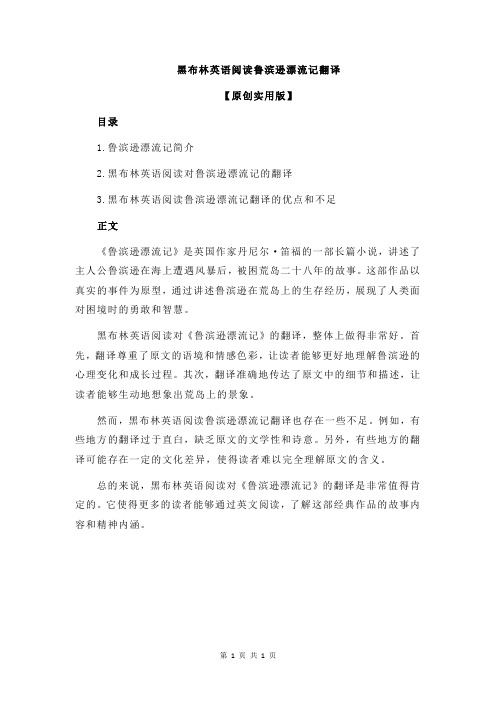
黑布林英语阅读鲁滨逊漂流记翻译
【原创实用版】
目录
1.鲁滨逊漂流记简介
2.黑布林英语阅读对鲁滨逊漂流记的翻译
3.黑布林英语阅读鲁滨逊漂流记翻译的优点和不足
正文
《鲁滨逊漂流记》是英国作家丹尼尔·笛福的一部长篇小说,讲述了主人公鲁滨逊在海上遭遇风暴后,被困荒岛二十八年的故事。
这部作品以真实的事件为原型,通过讲述鲁滨逊在荒岛上的生存经历,展现了人类面对困境时的勇敢和智慧。
黑布林英语阅读对《鲁滨逊漂流记》的翻译,整体上做得非常好。
首先,翻译尊重了原文的语境和情感色彩,让读者能够更好地理解鲁滨逊的心理变化和成长过程。
其次,翻译准确地传达了原文中的细节和描述,让读者能够生动地想象出荒岛上的景象。
然而,黑布林英语阅读鲁滨逊漂流记翻译也存在一些不足。
例如,有些地方的翻译过于直白,缺乏原文的文学性和诗意。
另外,有些地方的翻译可能存在一定的文化差异,使得读者难以完全理解原文的含义。
总的来说,黑布林英语阅读对《鲁滨逊漂流记》的翻译是非常值得肯定的。
它使得更多的读者能够通过英文阅读,了解这部经典作品的故事内容和精神内涵。
第1页共1页。
《鲁滨孙漂流记》读后感英文翻译5篇
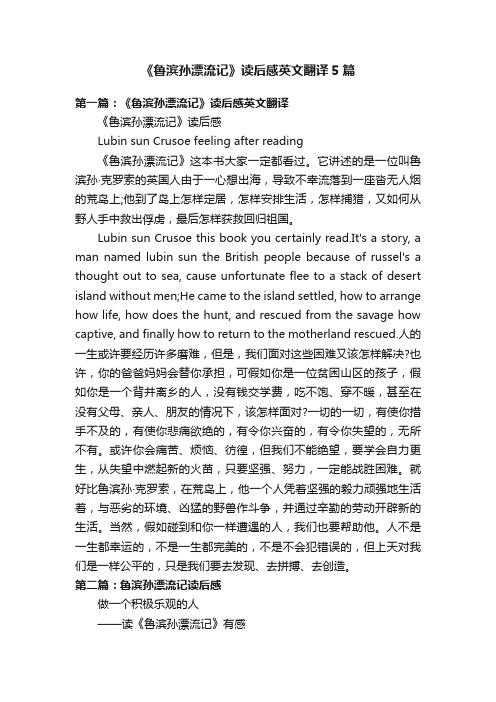
《鲁滨孙漂流记》读后感英文翻译5篇第一篇:《鲁滨孙漂流记》读后感英文翻译《鲁滨孙漂流记》读后感Lubin sun Crusoe feeling after reading《鲁滨孙漂流记》这本书大家一定都看过。
它讲述的是一位叫鲁滨孙·克罗索的英国人由于一心想出海,导致不幸流落到一座沓无人烟的荒岛上;他到了岛上怎样定居,怎样安排生活,怎样捕猎,又如何从野人手中救出俘虏,最后怎样获救回归祖国。
Lubin sun Crusoe this book you certainly read.It's a story, a man named lubin sun the British people because of russel's a thought out to sea, cause unfortunate flee to a stack of desert island without men;He came to the island settled, how to arrange how life, how does the hunt, and rescued from the savage how captive, and finally how to return to the motherland rescued.人的一生或许要经历许多磨难,但是,我们面对这些困难又该怎样解决?也许,你的爸爸妈妈会替你承担,可假如你是一位贫困山区的孩子,假如你是一个背井离乡的人,没有钱交学费,吃不饱、穿不暖,甚至在没有父母、亲人、朋友的情况下,该怎样面对?一切的一切,有使你措手不及的,有使你悲痛欲绝的,有令你兴奋的,有令你失望的,无所不有。
或许你会痛苦、烦恼、彷徨,但我们不能绝望,要学会自力更生,从失望中燃起新的火苗,只要坚强、努力,一定能战胜困难。
就好比鲁滨孙·克罗索,在荒岛上,他一个人凭着坚强的毅力顽强地生活着,与恶劣的环境、凶猛的野兽作斗争,并通过辛勤的劳动开辟新的生活。
鲁宾逊漂流记赏析(英文版)
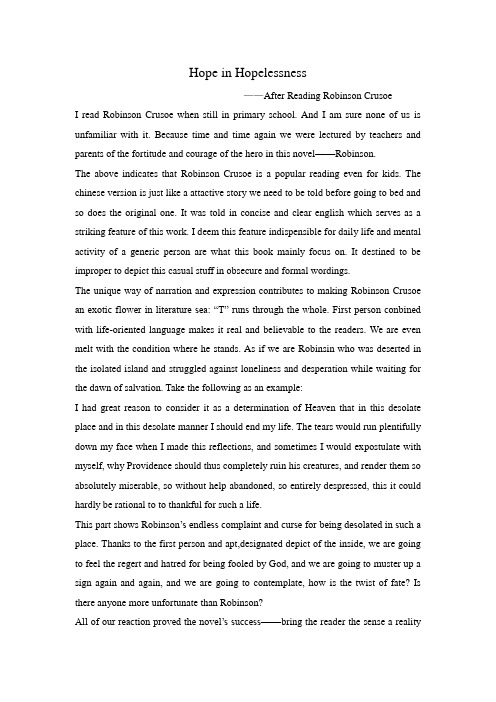
Hope in Hopelessness——After Reading Robinson CrusoeI read Robinson Crusoe when still in primary school. And I am sure none of us is unfamiliar with it. Because time and time again we were lectured by teachers and parents of the fortitude and courage of the hero in this novel——Robinson.The above indicates that Robinson Crusoe is a popular reading even for kids. The chinese version is just like a attactive story we need to be told before going to bed and so does the original one. It was told in concise and clear english which serves as a striking feature of this work. I deem this feature indispensible for daily life and mental activity of a generic person are what this book mainly focus on. It destined to be improper to depict this casual stuff in obsecure and formal wordings.The unique way of narration and expression contributes to making Robinson Crusoe an exotic flower in literature sea: “T” runs through the whole. First person conbined with life-oriented language makes it real and believable to the readers. We are even melt with the condition where he stands. As if we are Robinsin who was deserted in the isolated island and struggled against loneliness and desperation while waiting for the dawn of salvation. Take the following as an example:I had great reason to consider it as a determination of Heaven that in this desolate place and in this desolate manner I should end my life. The tears would run plentifully down my face when I made this reflections, and sometimes I would expostulate with myself, why Providence should thus completely ruin his creatures, and render them so absolutely miserable, so without help abandoned, so entirely despressed, this it could hardly be rational to to thankful for such a life.This part shows Robinson’s endless complaint and curse for being desolated in such a place. Thanks to the first person and apt,designated depict of the inside, we are going to feel the regert and hatred for being fooled by God, and we are going to muster up a sign again and again, and we are going to contemplate, how is the twist of fate? Is there anyone more unfortunate than Robinson?All of our reaction proved the novel’s success——bring the reader the sense a realityand participation.What’s more, if there is only an “I” telling a daily life experience, I assure you of a dull daybook. But the details and wonderful plots fasten reader heartstring most. Especially the up-and-down hope of being rescued:One day, when Robinson was repeating the pale life, suddenly he saw a ship-shaped thing appeared on the horizon. He was much of a bliss and resorted to all eye-catching stuff to make himself seen. He waved, shouted, brandished, even flung into the sea to swim there…As we are lighten up but the sparse dawn and thinking he surviv e eventually, the ship turned smaller and smaller, and final reduced to a hardly visible spot. Our heart slump through the floor with Robinson. Owning a missing chance once is more miserable than having no chance. It cheers you up in the air but suddenly hit you onto ground.Similar plots and turning points appear every now and then in the book thus making it exciting but real as a normal life.Besides, a clear clue and structure also keeps us in track of Robinson.Apart from these, what we get from it also include mental inspiration.There can be little doubt that the most significant force sustains the hero’s struggle is the reflection on the religion. The course he strenuously strives for the better survival environment can’t be gone through w The Life and Strange Surprising Adventures of Robinson CrusoeBy Book ReportDaniel DefoeAviation Industry Press, 2007,286 pp, ¥14.8ISBN 978-7-80183-886-5Daniel Defoe is an adventure fiction writer, and his writing embodies the spirit of adventure, which presents the tremendous power of human being and their wits and courage. The story happened in the middle of 17th century, and in this period of time, the development of bourgeoisie stimulate many people to search for wealth. Robinson, the shape he is a representative of the emerging capitalist class, an idealized hero. In the story, Robinson’s adventurous spirit goes through the whole story, and as a reader, I am deeply inspired by his self-reliant, courageous, heroic, and resourceful life experience.The sto ry of Robinson Crusoe can be divided into three parts: Robinson’s youth and the time up to his shipwreck; his twenty-eight years on an uninhabited island; his lie and adventures after being rescued from the island.In the first part, Robinson wishes to pursue his livelihood by going to sea.Although his father wants him to live a peaceful life, his thoughts are entirely bent upon seeing the world, and he should never settle to anything with enough resolution to go through with it. He is not restless and alive and never satisfied, and finally he escapes. As a son, he can just stay at home, inheriting his father’s wealth and living a comfortable life. However, he doesn’t. He tries his best to venture, no matter what ventures there will be, and he pursues his dreams without hesitating to escape from dangers. It inspires me in my struggles, when I am satisfied with my current situation, I feel ashamed comparing to Robinson’s chase. Robinson offers me a kind of mental strength which motivates me to forge ahead. Without being afraid of hardship, he goes forward bravely, satisfying his curiosity and achieving his dream.The critical part of the story should be the second part. Here I get to know how he accomplishes his survival and even establishes his "kingdom"; how he moves from a frantic state of discontent to one of resignation and contentment; how he meets Friday and, finally, how he leaves the island. Before reading this novel,I have never got a concept of living in an isolated island, sometimes I even think that it’s not very difficult to live. When reading it, I was not inspired by Robinson’s spirit, but also the challenging way of living. He builds house for himself, considering all possible shortcomings with his logical mind; he trains goats for milk and meat; he grows corns to make bread; he dries the grapes; etc. He never shrinks, even when he himself lives in the island. He is so confident and determined that he finds ways to make a good living. Robinson did it, and in a perfect way. What he has done, represents the characters of a true hero, true man. I feel unprecedented admiration for him, and I am deeply encouraged that we human beings can achieve what we want to if we have persistence and confidence. The most impressive part to me lies in his chase of knowledge, he finds a Bibl e to read, which comfort him in mind and makes him still feel thankful to god under such circumstances. If it was me, I can’t read books there, and I feel guilty that I have a good chance to read books but I never relish. Besides, he is not contented with his life, and he always seeks for new challenges, which may ruin what he has in present. It is really very hard for common people to be, it is not easy to find a shelter in an island, and most people would be thankful to their being living. However, he never stops his steps of venturing, even when he meets the savage, he rescues Friday, to the most important, he never feel regretful of escaping from his warm family. His continued pioneering spirit motives readers to be inspired, and motives me to struggle for my life. For me, I realized that life is full of amazements, and we have to move forward all the time, in order to refresh our spirit. It is important that whatever we come across, we should have a calm mind, and try every means to overcome difficulties.The third part of the novel traces Robinson’s securing of wealth through the honesty and loyalty of friends, his return to England, travels through the continent and a last trip to his island to see how those he left there fared. Even sometimes there seems everything miserable, however, when there is a will, there is a way, never lose confidence, and there is a bright future. Robinson has been away for 28 years that it becomes totally a harsh place for him to exist, because his intelligence and calmness, he possesses a large fortune. It tells that a capable person is the most powerful weaponof living.The writer shapes a very successful character by using plain language and natural description. The story inspires me a lot in following my dreams, and gives me courage in overcoming difficulties on the way of exploring.I was deeply attracted by the spirit embodied in the story. In each period of Robinson’s life, he performs the way of searching and persisting, which makes me excited and encouraged, and the truth is, I will persist in everything necessary. And I believe that I can follow Robinson’s example, and finally soar my dreams without a sense of regret.《鲁宾逊漂流记》读后感2篇〖文字大小:大中小〗〖打印〗〖收藏到:QQ 百度雅虎〗〖在线字典〗当我郑重地翻过最后一页,合上这位被誉为“英国小说之父”的丹尼尔•笛福在59岁高龄写的著作——《鲁滨逊漂流记》。
浅析《鲁滨孙漂流记》的英语翻译技巧

2018年49期总第437期ENGLISH ON CAMPUS浅析《鲁滨孙漂流记》的英语翻译技巧文/文凤【摘要】中学生文学经典阅读中,我最喜欢的是英国作家丹尼尔·笛福在1719年出版的代表作《鲁滨孙漂流记》。
这部著作自问世以来,广受世界各地的读者喜爱,被翻译成几十种语言,经久不衰。
而中文译本读来也朗朗上口,颇具韵味,可以从中品味翻译者的功力和风格。
本文以唐荫荪翻译的《鲁滨孙漂流记》为范本,探究其中的英语翻译技巧,供读者品读。
【关键词】《鲁滨孙漂流记》;英语翻译技巧【作者简介】文凤,湖南省祁阳县第一中学。
一、引言提到航海冒险野外生存,你会想到什么?可能是惊险刺激、茂密丛林或原始动物。
而早在百年前,英国作家丹尼尔·笛福就出版了这样一部作品,描述了一位渴望航海的男性,鲁滨孙出身富裕,但他不满于现实的生活,一心向海,多次出海。
第一次航行时不幸遇到大风浪,费劲千辛万苦终于捡回一条性命。
第二次出海去非洲,赚回一笔。
第三次航行再次遭遇不幸,被俘虏当做奴隶,后来逃跑被货船救起,行驶到巴西,他在当地买园子,靠当庄园主发财。
这样的日子让他再次渴望出海。
这次出海航行又遇风浪,船只触礁,只有鲁滨孙一人得以幸存,漂流到一个荒无人烟的小岛上,开始了孤岛独自生存的旅程。
一开始,他积极地寻求出路,沉船桅杆做筏,把船上的食物、衣服等必需品和枪支弹药等自保设备运到岛上,在孤岛山上“扎营筑寨”。
多次寻求离开孤岛的方法,但无果,这没有让他放弃希望,而是打起了长期攻坚战。
他开始在孤岛上种植粮食,例如大麦和稻子,再用简单的工具制作面粉,烘焙面包。
而且捕捉驯养野生山羊,保证自己的基本生活。
同时也在制作独木舟,希望离开小岛。
很快,鲁滨孙在孤岛上就生活了18年,他后来无意发现孤岛海岸白骨森森,意识到这里有野人食人,让他感到惊惧和警惕。
此后,再过了8年,小岛上又来了野人,准备食人办宴会。
鲁滨孙发现了他们的踪迹,而且救出了一位俘虏,命名他为“星期五”。
鲁滨逊漂流记注解
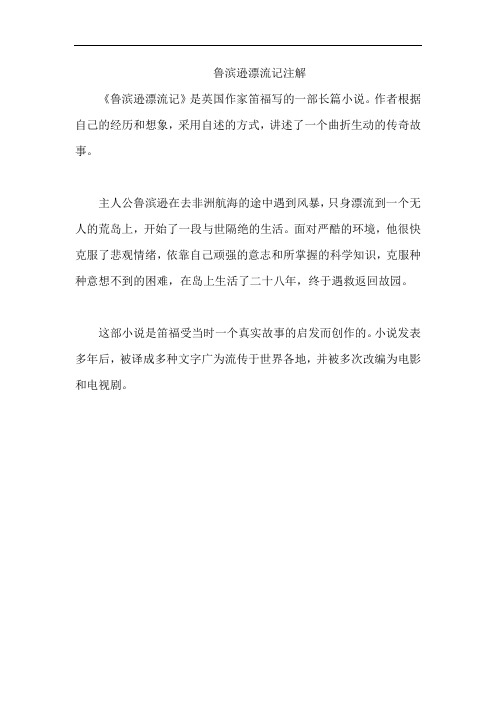
鲁滨逊漂流记注解
《鲁滨逊漂流记》是英国作家笛福写的一部长篇小说。
作者根据自己的经历和想象,采用自述的方式,讲述了一个曲折生动的传奇故事。
主人公鲁滨逊在去非洲航海的途中遇到风暴,只身漂流到一个无人的荒岛上,开始了一段与世隔绝的生活。
面对严酷的环境,他很快克服了悲观情绪,依靠自己顽强的意志和所掌握的科学知识,克服种种意想不到的困难,在岛上生活了二十八年,终于遇救返回故园。
这部小说是笛福受当时一个真实故事的启发而创作的。
小说发表多年后,被译成多种文字广为流传于世界各地,并被多次改编为电影和电视剧。
鲁滨逊漂流记英语读后感带翻译
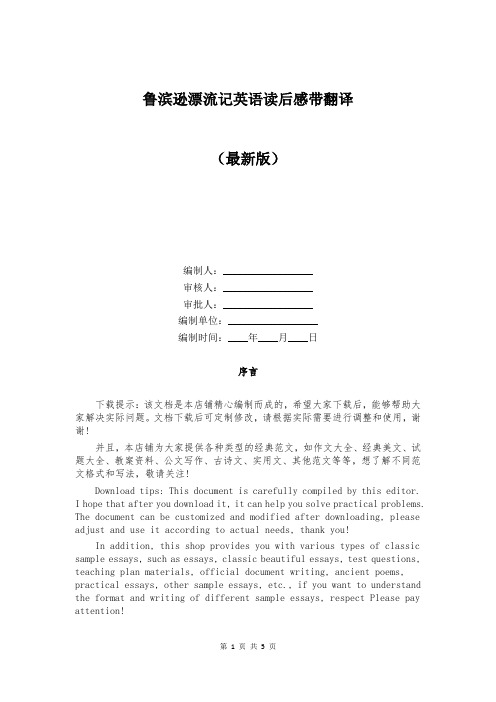
鲁滨逊漂流记英语读后感带翻译(最新版)编制人:__________________审核人:__________________审批人:__________________编制单位:__________________编制时间:____年____月____日序言下载提示:该文档是本店铺精心编制而成的,希望大家下载后,能够帮助大家解决实际问题。
文档下载后可定制修改,请根据实际需要进行调整和使用,谢谢!并且,本店铺为大家提供各种类型的经典范文,如作文大全、经典美文、试题大全、教案资料、公文写作、古诗文、实用文、其他范文等等,想了解不同范文格式和写法,敬请关注!Download tips: This document is carefully compiled by this editor.I hope that after you download it, it can help you solve practical problems. The document can be customized and modified after downloading, please adjust and use it according to actual needs, thank you!In addition, this shop provides you with various types of classic sample essays, such as essays, classic beautiful essays, test questions, teaching plan materials, official document writing, ancient poems, practical essays, other sample essays, etc., if you want to understand the format and writing of different sample essays, respect Please pay attention!鲁滨逊漂流记英语读后感带翻译鲁滨逊漂流记英语读后感带翻译《鲁滨逊漂流记》描述探险家鲁滨逊在一次航行中船只失事,流落到一个杳无人烟的荒岛长达28年时间,完全与世隔绝的故事。
六年级语文下册《《鲁滨孙漂流记》梗概》课文原文及赏析
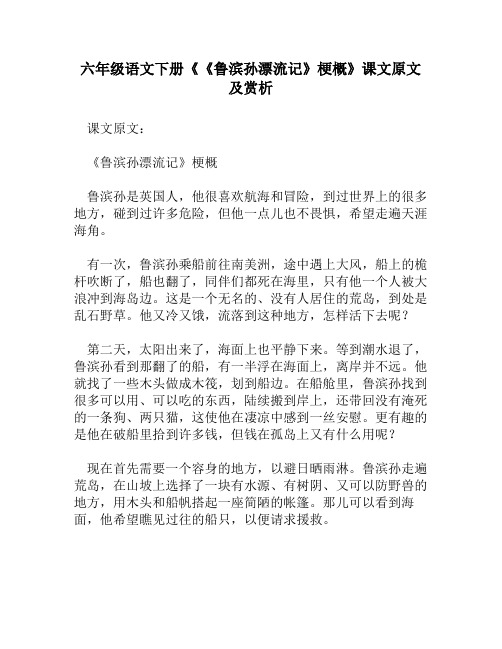
六年级语文下册《《鲁滨孙漂流记》梗概》课文原文及赏析课文原文:《鲁滨孙漂流记》梗概鲁滨孙是英国人,他很喜欢航海和冒险,到过世界上的很多地方,碰到过许多危险,但他一点儿也不畏惧,希望走遍天涯海角。
有一次,鲁滨孙乘船前往南美洲,途中遇上大风,船上的桅杆吹断了,船也翻了,同伴们都死在海里,只有他一个人被大浪冲到海岛边。
这是一个无名的、没有人居住的荒岛,到处是乱石野草。
他又冷又饿,流落到这种地方,怎样活下去呢?第二天,太阳出来了,海面上也平静下来。
等到潮水退了,鲁滨孙看到那翻了的船,有一半浮在海面上,离岸并不远。
他就找了一些木头做成木筏,划到船边。
在船舱里,鲁滨孙找到很多可以用、可以吃的东西,陆续搬到岸上,还带回没有淹死的一条狗、两只猫,这使他在凄凉中感到一丝安慰。
更有趣的是他在破船里拾到许多钱,但钱在孤岛上又有什么用呢?现在首先需要一个容身的地方,以避日晒雨淋。
鲁滨孙走遍荒岛,在山坡上选择了一块有水源、有树阴、又可以防野兽的地方,用木头和船帆搭起一座简陋的帐篷。
那儿可以看到海面,他希望瞧见过往的船只,以便请求援救。
鲁滨孙在岛上定居下来,过着寂寞的生活。
他没有更高的要求,但是破船上搬下来的食物很快吃光了,要想活下去,就得想办法。
他每天拿着枪,带着狗到森林里去打猎,或到海边去捕鱼,并且把捕到的活山羊畜养起来。
后来他竟有了成群的山羊,可以常喝羊奶,吃羊肉。
搬来的东西里,有一些麦子,他把它们撒到围墙里,不久长出了嫩芽,后来结出了十几个穗子。
他用这点儿麦种反复种收,到了第四年,终于吃到了自己种的粮食。
十八年过去了。
有一天,鲁滨孙忽然发现海边沙滩上有人的脚印。
他恐惧万分,猜想这一定是附近陆地上的野人留下来的。
他担心这些野人会来吃掉他。
于是在住所前的空地上密密麻麻地插上树枝作防御,又把羊分成几个地方圈养。
他在这种不安的心情下又生活了两年。
后来,鲁滨孙再一次看到野人留下的生火的痕迹和满地的人骨,这使他联想到他们野蛮的宴会。
鲁滨逊漂流记英语详细分析

鲁滨逊漂流记英语详细分析NARRA TOR ? Robinson Crusoe is both the narrator and main character of the tale.POINT OF VIEW ? Crusoe narrates in both the first and third person, presenting what he observes. Crusoe occasionally describes his feelings, but only when they are overwhelming. Usually he favors a more factual narrative style focused on actions and events.TONE ? Crusoe’s tone is mostly detached, meticulous, and objective. He displays little rhetorical grandeur and few poetic or colorful turns of phrase. He generally avoids dramatic storytelling, preferring an inventorylike approach to the facts as they unfold. He very rarely registers his own feelings, or those of other characters, and only does so when those feelings affect a situation directly, such as when he describes the mutineers as tired and confused, indicating that their fatigue allows them to be defeated.TENSE ? PastSETTING (TIME) ? From 1659 to 1694SETTING (PLACE) ? York, England; then London; then Sallee, North Africa; then Brazil; then a deserted island off Trinidad; then England; then Lisbon; then overland from Spain toward England; then England; and finally the island again PROTAGONIST ? Robinson CrusoeMAJOR CONFLICT ? Shipwrecked alone, Crusoe struggles against hardship, privation, loneliness, and cannibals in his attempt to survive on a deserted island.RISING ACTION ? Crusoe disobeys his father and goes out to sea. Crusoe has a profitable first merchant voyage, has fantasies of success in Brazil, and prepares for a slave-gathering expedition. CLIMAX ? Crusoe becomes shipwrecked on an island near Trinidad, forcing him to fend for himself and his basic needs.FALLING ACTION ? Crusoe constructs a shelter, secures a food supply, and accepts his stay on the island as the work of Providence.THEMES ? The ambivalence of mastery; the necessity of repentance; the importance of self-awarenessMOTIFS ? Counting and measuring; eating; ordeals at seaSYMBOLS ? The footprint; the cross; Crusoe’s bowerFORESHADOWING ? Crusoe suffers a storm at sea near Yarmouth, foreshadowing his shipwreck years later. Crusoe dreams of cannibals arriving, and later they come to kill Friday. Crusoe invents the idea of a governor of the island to intimidate the mutineers, foreshadowing the actual governor’s later arrivalAnalysis of Major CharactersRobinson CrusoeWhile he is no flashy hero or grand epic adventurer, Robinson Crusoe displays character traits that have won him the approval of generations of readers. His perseverance in spending months making a canoe, and in practicing pottery making until he gets it right, is praiseworthy. Additionally, his resourcefulness in building a home, dairy, grape arbor, country house, and goat stable from practically nothing is clearly remarkable. The Swiss philosopher Jean-Jacques Roussea u applauded Crusoe’s do-it-yourself independence, and in his book on education, Emile, he recommends that children be taught to imitate Crusoe’s hands-on approach to life. Crusoe’s business instincts are just as considerable as his survival instincts: he manages to make a fortune in Brazil despite a twenty-eight-year absence and even leaves his island with a nice collection of gold. Moreover, Crusoe is never interested in portraying himself as a hero in his own narration. He does not boast of his courage in quelling the mutiny, and he is always ready to admit unheroic feelings of fear or panic, as when he finds the footprint on the beach. Crusoe prefers to depict himself as an ordinary sensible man, never as an exceptional hero.But Crusoe’s admirable qualit ies must be weighed against the flaws in his character. Crusoe seems incapable of deep feelings, as shown by his cold account of leaving his family—he worries about the religious consequences of disobeying his father, but never displays any emotion about leaving. Though he is generous toward people, as when he gives gifts to his sisters and the captain, Crusoe reveals very little tender or sincere affection in his dealings with them. When Crusoe tells us that he has gotten married and that his wife has died all within the same sentence, his indifference to her seems almost cruel. Moreover, as an individual personality, Crusoe is rather dull. His precise and deadpan style of narration works well forrecounting the process of canoe building, but it tends to drain the excitement from events that should be thrilling. Action-packed scenes like the conquest of the cannibals become quite humdrum when Crusoe narrates them, giving us a detailed inventory of the cannibals in list form, for example. His insistence on dating events makes sense to a point, but it ultimately ends up seeming obsessive and irrelevant when he tells us the date on which he grinds his tools but neglects to tell us the date of a very important event like meeting Friday. Perhaps his impulse to record facts carefully is not a survival skill, but an irritating sign of his neurosis.Finally, while not boasting of heroism, Crusoe is nonetheless very interested in possessions, power, and prestige. When he first calls himself king of the island it seems jocund, but when he describes the Spaniard as his subject we must take his royal delusion seriously, since it seems he really does consider himself king. His teaching Friday to call him “Master,” even before teaching him the words for “yes” or “no,” seems obnoxious even under the racist standards of the day, as if Crusoe needs to hear the ego-boosting word spoken as soon as possible. Overall, Crusoe’s virtues tend to be private: his industry, resourcefulness, and solitary courage make him an exemplary individual. But his vices are social, and his urge to subjugate others is highly objectionable. In bringing both sides together into one complex character, Defoe gives us a fascinating glimpse into the successes, failures, and contradictions of modern man.Important Quotations Explained1. “O drug!” said I aloud, “what art thou good for? Thou art not worth to me, no, not the taking off of the ground; one of those knives is worth all this heap; I have no manner of use for thee; e’en remain where thou art and go to the bottom as a creature whose life is not worth saving.” However, upon second thoughts, I took it away. . . .2. My island was now peopled, and I thought myself very rich in subjects; and it was a merry reflection, which I frequently made, how like a king I looked. First of all, the whole country was my own mere property, Baso that I had an undoubted right of dominion. Secondly, my people were perfectly subjected. I was absolute lord and lawgiver, they all owed their lives to me, and were ready to lay down their lives, if there had been occasion of it, for me3. I was born in the year 1632, in the city of York, of a good family, though not of that country, my father being a foreigner of Bremen who settled first at Hull. He got a good estate by merchandise and, leaving off his trade, lived afterward at York, from whence he had married mymother whose relations were named Robinson, a very good family in that country, and from whom I was called Robinson Kreutznaer; but by the usual corruption of words in England we are called, nay, we call ourselves, and write our name “Crusoe,” and so my companions always called me.4. I might well say now indeed, that the latter end of Job was better than the beginning. It is impossible to express here the flutterings of my very heart when I looked over these letters, and especially when I found all my wealth about me; for as the Brazil ships come all in fleets, the same ships which brought my letters brought my goods. . . .5. But no sooner were my eyes open, but I saw my Poll sitting on top of the hedge; and immediately knew that it was he that spoke to me; for just in such bemoaning language I had used to talk to him, and teach him; and he learned it so perfectly that he would sit upon my finger and lay his bill close to my face, and cry, “Poor Robin Crusoe! Where are you? Where have you been? How come you here?” and such things as I had taught him.Study Questions1. Defoe has his hero practice two different types of writing in the novel. One type is the journal that Crusoe keeps for a few chapters until his ink runs out. The other is the fuller type of storytelling that makes up the bulk of the novel. Both are in the first-person voice, but they produce different effects. Why does Defoe include both types? What does a comparison between them tell us about the overall purpose of the novelWith his interest in practical details, Crusoe naturally gravitates toward the journal as a form of writing. His idea of journal keeping follows the example of a captain’s logb ook rather than a personal diary: it is objective and factual, sometimes tediously so, rather than emotional or self-reflective. But Defoe could not sustain the whole novel as a journal, since much of the moral meaning of the story emerges only retrospectively. Having survived his ordeal, Crusoe can now write his story from the perspective of one remembering past mistakes and judging past behavior. The day-by-day format of the journal is focused on the present rather than the past, and it makes this kind of retrospection difficult. The moral dimension of the novel can best be emphasized through a full autobiographical narrative, with Crusoe looking back upon earlier stages of life and evaluating them3. Crusoe spends much time on the island devising ways to escape it. But when he finally does escape, his return to Europe is anticlimactic. Nothing he finds there, not even friends or family, is described with the same interest evoked earlier by his fortress or farm. Indeed, at the end of the novel Crusoe returns to the island. Why does Defoe portray the island originally as a place of captivity and then later as a desired destination?Crusoe’s ordeal is not merely the adventure tale it seems at first, but a moral and religious illustration of the virtues of solitude and self-reliance. At the beginning, Crusoe can only perceive his isolation as a punishment. But after his religious illumination, and after he has turned an uninhabited island into a satisfying piece of real estate, he learns to relish his solitude. His panic at the sight of a footprint shows how he has come to view other humans as threatening invaders ofhis private realm. His fellow humans in Europe undoubtedly also represent not the advantages of society, but the loss of empowered solitude, and so he dreams of returning to the island where he was king alone.Suggested Essay Topics1. Although he is happy to watch his goat and cat population multiply on his island, Crusoe never expresses any regret for not having a wife or children. He refers to his pets as his family, but never mentions any wish for a real human family. While he is sad that his dog never has a mate, he never seems saddened by his own thirty-five years of bachelor existence. Does Crusoe’s indifference to mating and reproduction tell us anything about his view of life, or about the novel?2. Although Crusoe proudly reports that he allows freedom of religion on his island, giving his Catholic and pagan subjects the right to practice their own faiths, he describes Friday as a Protestant. He attempts to rid his servant of his belief in the pagan god Benamuckee. Why does Crusoe generally show religious tolerance, but insist on Friday’s Protestantism?3. During the return voyage to England from Lisbon at the end of the novel, Crusoe and his traveling party encounter a bear that is frightening until Friday turns it into an amusing spectacle. His teasing of the bear, which prompts the group’s laughter, is the first example of live entertainment in the novel. There is no mention of Friday trying to amuse Crusoe on the island. Does this episode foreshadow a new role for Friday after he moves to Europe from the Caribbean? What is Defoe trying to symbolize in having Crusoe bring Friday with him to Europe at all?4. In many ways Crusoe appears to be the same sort of person at the end of the novel as he is at the beginning. Despite decades of solitude and exile, wars with cannibals, and the subjugation of a mutiny, Crusoe hardly seems to grow or develop. Is Crusoe an unchanging character, or does he change in subtle ways as a result of his ordeal?5. Crusoe’s religious illumination, in which he beholds an angelic figure descending on a flame, ordering him to repent or die, is extremely vivid. Afterward he does repent, and his faith seems sincere. Yet Defoe complicates this religious experience by making us wonder whether it is instead a result of Crusoe’s fever, or of the tobacco and rum he has consumed. We wonder whether the vision may be health- or drug-related rather than supernatural and divine. Why does Defoe mix the divine and the medical in this scene? Does he want us to question Crusoe’s turn to religion?Quiz1. When Crusoe eats eggs on the island, from what animal do they come?(A) Seagull (B) Quail (C) Penguin (D) Turtle2. Which of th e following describes Robinson Crusoe’s place in his family?(A) Oldest son (B) Middle son (C) Youngest son (D) Only son3. Crusoe names his servant Friday in honor of what?(A) Good Friday(B) The day on which the native’s life was saved(C) The last workday before the weekend(D) The day on which Crusoe’s life was saved4. In what century is Robinson Crusoe set?(A) Sixteenth (B) Nineteenth (C) Eighteenth (D) Seventeenth5. Where does Crusoe serve as a slave?(A) North Africa (B) Sub-Saharan Africa (C) Spain (D) Brazil6. To what does the name Xury refer?(A) The African port where Crusoe is enslaved(B) The Brazilian town where Crusoe settles(C) The name of Friday’s father(D) The name of a slave boy7. How does Crusoe first grow grain on the island?(A) Friday gives him seeds(B) He throws seeds by accident when he discards cornhusks(C) He salvages seeds from the Spanish wreck(D) He transplants grain from another area of the island8. To what does the name Poll refer?(A) A widow (B) A pet bird (C) A servant girl (D) A ship9. Of what nationality are the mutineers on the ship that arrives?(A) Spanish (B) Brazilian (C) Moorish (D) English10. What does Crusoe do after drinking a rum and tobacco mixture?(A) Expresses his love to Friday(B) Paddles his canoe into a dangerous current(C) Accidentally sets his hut on fire(D) Experiences a religious illumination11. Why is Friday excited when he sees the cannibals’ captive in the boat?(A) The captive is Friday’s father(B) The captive is Friday’s hated enemy(C) The captive is Friday’s brother(D) The captive is Friday’s fiancée12. Crusoe is frightened in a cave when he sees whose eyes?(A) A goat’s (B) A cannibal’s(C) The Spaniard’s (D) The captain’s13. Why does Crusoe’s first attempt at maki ng a canoe fail?(A) The wood is rotten(B) The canoe is too fragile(C) The canoe is too heavy(D) Termites eat through the bottom14. What livestock makes up Robinson’s meat supply on the island?(A) Rabbits (B) Wildfowl (C) Goats (D) Cows15. To what does the name Benamuckee refer?(A) Friday’s father (B) Friday’s cannibal feast(C) Friday’s tribe (D) Friday’s god16. Crusoe’s father wishes his son to go into which profession?(A) Law (B) Medicine (C) Business (D) Farming17. How does Crusoe impress the natives on the African coast?(A) Showing them his watch(B) Killing a leopard(C) Giving them rum(D) Sailing the boat in circles18. The cross that Crusoe erects on the island serves as what?(A) A religious icon (B) A scarecrow(C) A calend (D) A sign for passing ships19. When Crusoe departs on his second trading voyage, with whom does he leaves some of his money?(A) A widow friend (B) His father (C) His sister (D) A London merchant20. To what does the name Sallee refer?(A) Crusoe’s first shi p(B) A North African territory(C) The river bordering Crusoe’s plantation(D) A weapon used by the cannibals21. In Europe, Crusoe encounters ravenous wolves in which country?(A) England (B) France (C) Belgium (D) Spain22. Which type of fruit does Crusoe learn how to dry?(A) Bananas (B) Grapes(C) Pineapples(D) Apples23. Two years after discovering the footprint, with what does Crusoe find the shore strewn?(A) Clothing(B) The remains of a ship(C) Human body parts(D) Goat carcasses24. After returning to England, what does Crusoe find out about his family?(A) They are dead except for two sisters(B) They are dead except for one brother(C) They are not overjoyed to see him alive(D) They have moved away from England years earlier25. Why doesn’t Crusoe take his wife back to the island with him?(A) She is pregnant(B) He realizes he does not love her like he loves Friday(C) She dies(D) She is too prone to seasicknessDCBDA DBBDD AACCD ABCAB DBCAC。
- 1、下载文档前请自行甄别文档内容的完整性,平台不提供额外的编辑、内容补充、找答案等附加服务。
- 2、"仅部分预览"的文档,不可在线预览部分如存在完整性等问题,可反馈申请退款(可完整预览的文档不适用该条件!)。
- 3、如文档侵犯您的权益,请联系客服反馈,我们会尽快为您处理(人工客服工作时间:9:00-18:30)。
英美文学选读鲁滨逊漂流记翻译分析
Daniel Defoe(丹尼尔·笛福) is an English writer, the founder of English realistic novels in the Enlightenment period. They are known as "the father of English novels". His works are readable, and the main frame is that the protagonist, through his efforts to overcome difficulties by wisdom and courage, shows the social atmosphere of pursuing adventure and advocating personal struggle. His representative work, Robinson Crusoe, created Robinson, a typical figure who struggled with difficulties.
In England, literature began with poetry and drama. In 1719, Robinson Crusoe was the first real novel in England. The hero of Robinson Crusoe is the symbol of the brave adventurer of the bourgeois bourgeois in the budding period of capitalism, and Robinson's story is adapted to the need of the tide of the time.
The book takes Robinson's adventures as a clue about how he is away from home, escaping from pirates, landing on the island, how to survive in a bad Island, and finally how to return to Britain. Robinson Crusoe has used many psychological descriptions to
shape the vivid character of Robinson, the protagonist. Through a series of psychological descriptions, Robinson's thought changes were revealed, and his personality characteristics were revealed to a great extent. When Robinson was killed in the sea, he thought, "no doubt, I will never see them again."
In my eyes, Robinson is not only a successful adventurer, but also a successful businessman. As a successful man, he did have good conditions. He has dreams, perseverance, intelligence and self-reliance; he is brave enough to make decisions and dare to bear consequences; he is optimistic, cheerful and confident. There is no doubt that his psychological quality is high and his psychological endurance is very strong, otherwise he will not be able to overcome the strange environment, lonely psychology, and live alone on an uninhabited island for 23 years.
丹尼尔·笛福(丹尼尔笛福)是英国作家,启蒙运动时期英国现实主义小说的创始人。
他们被称为“英国小说之父”。
他的作品是可读的,主要框架是主人公通过智慧和勇气克服困难,展现了追求冒险和倡导个人斗争的社会氛围。
他的代表作品《鲁滨逊漂流记》创造了鲁滨逊,一个与困难作斗争的典型人物。
在英国,文学始于诗歌和戏剧。
1719年,《鲁滨逊漂流记》是英国第一部真正的小说。
《鲁滨逊漂流记》中的英雄是资本主义萌芽时期资产阶级资产阶级勇敢冒险家的象征,鲁滨逊的故事适应了时代潮流的需要。
这本书把罗宾逊的冒险经历作为一个线索,关于他如何远离家乡,逃离海盗,登陆在岛上,如何在一个糟糕的岛屿上生存,以及最后如何返回英国。
《鲁滨逊漂流记》用了许多心理描述来塑造主人公罗宾逊生动的性格。
通过一系列的心理描述,罗宾逊的思想变了。
